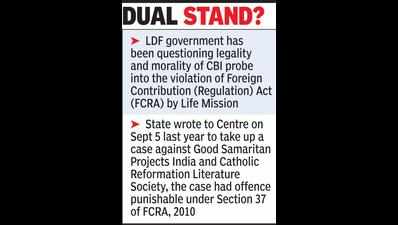- News
- City News
- thiruvananthapuram News
- FCRA: State had roped in CBI earlier
Trending
This story is from September 28, 2020
FCRA: State had roped in CBI earlier

Thiruvananthapuram: The LDF government, which is questioning the legality and morality of the CBI probe into the violation of Foreign Contribution (Regulation) Act (FCRA) by Life Mission, is in a fix with information emerging that they had handed over a similar case involving two NGOs, to the CBI, citing that the CBI is the competent authority to investigate such cases.
Incumbent chief secretary Vishwas Mehta, who was the home secretary then, had on September 5, last year, written to the Centre to take up the case against Good Samaritan Projects India and Catholic Reformation Literature Society.
The government decided to hand over the case to the CBI after the state police chief reported to the government that the case against the two NGOs, which were being dealt by the crime branch, had offence punishable under Section 37 of the FCRA, 2010, and the CBI is the authority to probe the offences involving a prima facie violation of the offences under FCRA. Based on the state government’s request, the CBI had taken up the case and registered an FIR on April 30 this year, and a probe is on.
The CBI, that draws its power from the Delhi Special Police (Establishment) Act, has no original jurisdiction in any state. But it takes up the cases on three grounds if a high court or the Supreme Court asks it to take up a case, if the state government asks the agency to take up a case, and if the state government has given general consent on certain acts to take up cases.
General consent is usually given to help the CBI seamlessly conduct its inquiry into cases of corruption and almost all states have given such consent. But there has been instances when the state governments have turned hostile with the Centre and had withdrawn the consent given to the agency. If a state government withdraws general consent, the agency will not be able to register any fresh case in the state, involving a central government official or a private person stationed in these two states without getting case-specific consent. In November 2018, the then Andhra government and Bengal government had withdrawn the consents given to the agency, citing that the BJP-led Centre was trying to destabilise the state governments. States like Rajasthan, Chhattisgarh and Karnataka (restored later) also had withdrawn the general consent given to CBI.
But if a state government withdraws consent, the agency can still investigate old cases registered when general consent existed. The CBI can also conduct searches even if the consent is withdrawn, on the cases that are already registered. However, even if there is no general consent, there is no bar on the CBI probing cases relating to FCRA violations as it is a Central subject.
Incumbent chief secretary Vishwas Mehta, who was the home secretary then, had on September 5, last year, written to the Centre to take up the case against Good Samaritan Projects India and Catholic Reformation Literature Society.
The government decided to hand over the case to the CBI after the state police chief reported to the government that the case against the two NGOs, which were being dealt by the crime branch, had offence punishable under Section 37 of the FCRA, 2010, and the CBI is the authority to probe the offences involving a prima facie violation of the offences under FCRA. Based on the state government’s request, the CBI had taken up the case and registered an FIR on April 30 this year, and a probe is on.
The CBI, that draws its power from the Delhi Special Police (Establishment) Act, has no original jurisdiction in any state. But it takes up the cases on three grounds if a high court or the Supreme Court asks it to take up a case, if the state government asks the agency to take up a case, and if the state government has given general consent on certain acts to take up cases.
According to top agency sources, in the case of Kerala, the consent was given to the agency to investigate cases relating to acts, including NDPS Act and Prevention of Corruption Act (PCA). In the Life Mission case, in addition to probing the violation of FCRA regulations, the agency has also slapped PCA as well, on the basis of the petition that the agency received.
General consent is usually given to help the CBI seamlessly conduct its inquiry into cases of corruption and almost all states have given such consent. But there has been instances when the state governments have turned hostile with the Centre and had withdrawn the consent given to the agency. If a state government withdraws general consent, the agency will not be able to register any fresh case in the state, involving a central government official or a private person stationed in these two states without getting case-specific consent. In November 2018, the then Andhra government and Bengal government had withdrawn the consents given to the agency, citing that the BJP-led Centre was trying to destabilise the state governments. States like Rajasthan, Chhattisgarh and Karnataka (restored later) also had withdrawn the general consent given to CBI.
But if a state government withdraws consent, the agency can still investigate old cases registered when general consent existed. The CBI can also conduct searches even if the consent is withdrawn, on the cases that are already registered. However, even if there is no general consent, there is no bar on the CBI probing cases relating to FCRA violations as it is a Central subject.
End of Article
FOLLOW US ON SOCIAL MEDIA










